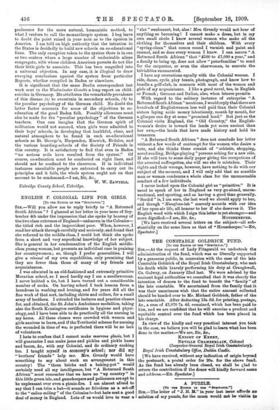ENGLISH V. COLONIAL LIFE FOR GIRLS.
[To THE EDITOR OP TER " SPECTATOR:] SIR,—Will you allow me to reply briefly to "A Returned South African " ? I glanced at her letter in your issue of Sep- tember 4th under the impression that she spoke by hearsay of the two class extremes of England—unknown in the Colonies— the titled rich and the improvident poor. When, however, I read her attack through carefully and seriously, and found that she referred to the middle class, I could but think she spoke from a short and very superficial knowledge of her subject. She is general in her condemnation of the English middle- class young woman, but presents an individual case in praising her countrywomen ; so, though I prefer generalities, I will give a resume of my own capabilities, only premising that they are fewer than those of many of my friends and acquaintances.
I was educated in an old-fashioned and extremely primitive Moravian school, so I need hardly say I am a needlewoman. I never knitted a tie, but I have turned out a considerable number of socks. On leaving school I took lessons from a laundress in washing and ironing, and for years did all the fine work of that sort, including shirts and collars, for a small army of brothers. I attended the lectures and practice classes for, and obtained, the St. John's Ambulance medallion, taking also the South Kensington certificates in hygiene and physi- ology, and I have been able to do practically all the nursing in my home. All these classes were crowded with women and girls anxious to learn, and if the Territorial scheme for nursing the wounded in time of was is perfected there will be no lack of volunteers.
I hate to confess that I cannot make marrons gla-cis, but I will guarantee I can make jams and pickles and pickle hams and bacon, &c., with any Colonial, and do ordinary cooking too. I taught myself in economy's school; nor did my " brothers' friends " help me. Mrs. Grundy would have something to say about such an arrangement in this country The " three bricks and a baking-pot " would certainly need all my intelligence, but "A Returned South African" must remember that we have no "up country" in this little green isle, and gamekeepers and policemen are apt to be unpleasant over even a picnic-fire. I am almost afraid to say that I can trim a hat—it sounds so frivolous as a set-off to the " calico ceiling" of the Colonies !—but hats cost a good deal of money in England. Lots of us would love to wear a " slat " sunbonnet, but, alas ! Mrs. Grundy would not hear of anything so becoming ! I cannot make a dress, but in my own small circle I know several women who make all the clothing for themselves and their children. With every "spring-clean" that comes round I varnish and paint and enamel, and so does every woman I know. I can assure " A Returned South African " that " 2500 to £1,000 a year," and a family to bring up, does not allow " paterfamilias " to send for the carpenter, or even the charwoman, to execute the trivialities enumerated.
I have my recreations equally with the Colonial woman. I ride, dance, cycle, play tennis, photograph, and know how to handle a golf-club, in common with most of the women and girls of my acquaintance. I like a good novel, too, in English or French ; German and Italian, also, when leisure permits.
With regard to the solitary instance of enterprise "A Returned South African" mentions, I would reply that there are hundreds of Englishwomen less well paid than their Colonial sisters laying aside money laboriously, month by month, for a glimpse oue day at some "promised land." But just as the Colonial visits England, the " Old Country," the English- woman's desire is toward the lands yet more ancient than her own,—the lands that have made history and hold its treasures.
"A Returned South African" does not conclude her letter without a few words of contempt for the women who desire a vote, and she thinks these consist of " athletic, shopping, novel-reading, Bridge-playing "persons aching for a new role. If she will turn to some daily paper giving the occupations of the arrested suffragettes, she will see she is mistaken. Their rights and their wrongs, however, have nothing to do with our subject of the moment, and I will only add that no sensible man or woman condemns a whole class for the unreasonable conduct of a few individuals.
I never looked upon the Colonial girl as "primitive." It is usual to speak of her in England as very go-ahead, uncon. ventional, and sporting, and as having a good time generally. " Sordid " is, I am sure, the last word we should apply to her, and though "Hausfrau-ish " scarcely accords with our idea of her open-air life, all honour to her if she deserves it. The English word with which I sign this letter is yet stronger—and more dignified.—I am, Sir, &c., HOUSEKEEPER. [We have received several letters on the subject—all sub- stantially on the same lines as that of "Housekeeper."—En. Spectator.]










































 Previous page
Previous page